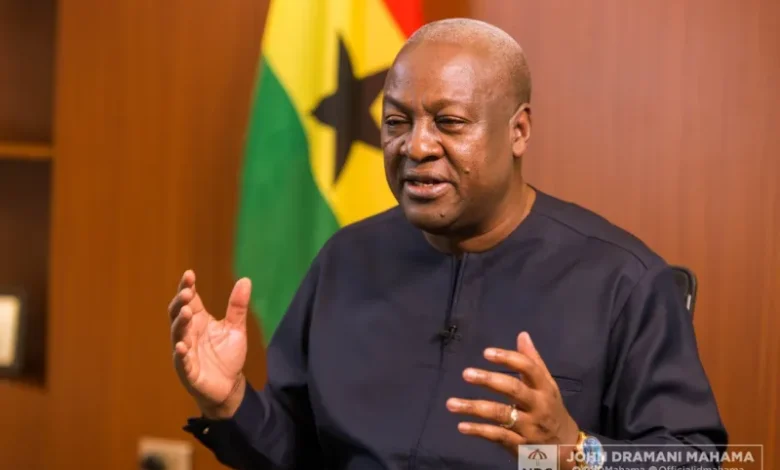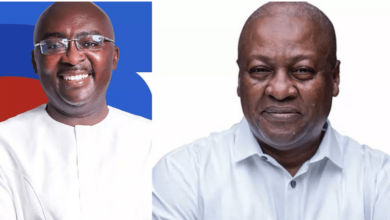Full text: Mahama’s address at Annual Transformation Dialogue on Small-Scale Mining

The flagbearer of the National Democratic Congress (NDC), John Dramani Mahama has outlined various initiatives meant for the mining sector that he would implement if given the opportunity to serve the country come January 7, 2025.
He shared this plan at the Annual Transformation Dialogue on Small-Scale Mining organised by the University of Energy and Natural Resources, Sunyani.
Please read full text below:
ADDRESS BY HE JOHN DRAMANI MAHAMA SPECIAL GUEST OF HONOUR
3RD ANNUAL TRANSFORMATIONAL DIALOGUE ON SMALL-SCALE MINING.
UNIVERSITY OF ENERGY AND NATURAL RESOURCES, SUNYANI.
Ladies and gentlemen,
Thank you, Professor John Kuwornu, and the faculty, members, staff, and students of the University of Energy and Natural Resources, for the opportunity to attend the 3rd Annual Transformational Dialogue on Small-Scale Mining.
Mining has been and will continue to be a significant contributor to our nation’s economy, but we must urgently acknowledge that illegal mining, including galamsey, has posed a severe and immediate threat to our environment, health, and economy.
We cannot afford to watch as our natural resources are plundered, and our communities suffer the consequences.
Ghana, blessed with abundant natural resources, including gold, has experienced the
devastating effects of illegal mining first-hand. Our rivers and lands have been polluted, our forests destroyed, and our people left without clean water and fertile land. We cannot allow illegal mining to continue unchecked, and we must chart a new vision for our country’s mining industry that prioritises sustainable development and responsible mining practices.
We must look to both local Ghanaian examples and global incidents to inform our approach to curbing illegal mining. In our own country, we have witnessed the destruction caused by illegal mining in places like the Ankobra and Pra Rivers. We have seen the devastation caused by illegal mining in the Atewa Forest Reserve, home to endangered species and vital to our country’s water supply. We cannot afford to lose these precious natural resources to the greed of a few individuals.
Internationally, we have seen the tragic consequences of illegal mining in places like Brazil, where the recent collapse of a dam at an illegal mining site resulted in the loss of hundreds of lives. Such incidents are a stark reminder of the dangers of unregulated mining and the need for more vigorous enforcement of mining laws and regulations.
To address these challenges, we must work together, including all of you, to develop and implement policies that priori>se sustainable mining practices and hold those who engage in illegal mining accountable. This will require a multifaceted approach that includes stricterenforcement of mining laws, increased investment in responsible mining technologies, and enhanced efforts to educate and empower small-scale miners to operate sustainably.
We must also priori>se preserving our environment and protecting our natural resources forfuture generations. This means taking bold steps to rehabilitate and restore areas affected by illegal mining and investing in renewable energy sources to reduce our reliance on traditional mining practices.
As leader of the National Democratic Congress (NDC) and incoming President of the Republic, I am deeply committed to working with all stakeholders to chart a new vision for our country’s mining industry. We must ensure that Ghana’s natural resources are managed to benefit all our people, not just a few.
Ladies and gentlemen, the small-scale mining sector plays a significant role in our economy—providing livelihoods for thousands of our people and contributing to the development of our nation. It has been both a bedrock of livelihood for many and a source of considerable environmental and safety concerns, as well as concerns about illegal mining activities.
Today, the sector stands at a crossroads, and the decisions we make or fail to make and the actions we take or fail to take will determine its role in our nation’s future. As a nation, we cannot fail to recognise the significant contributions of small-scale mining to our economy. It is estimated to provide employment for over a million Ghanaians and serve as a crucial source of income in many of our rural areas.
However, the environmental impact of unregulated activities has been profound, negatively affecting our water bodies, land, and forests. I am dedicated to supporting the transformation of small-scale mining, and my vision in this regard is clear.
My party, the NDC, and I aim to reform small-scale mining into a better, regulated, environmentally responsible, and economically viable sector. You all agree with me, ladies and gentlemen, that we can develop the sector into one that contributes to our economy in a sustainable manner while respecting our environmental heritage.
Over the past seven years, small-scale miners in the country have endured enough government mishandling of the sector, such as equipment confiscatio and, in some cases, the loss of lives of innocent Ghanaians.
Let me share with you a few of what I intend to do in this sector, some key proposals, and initiatives we will implement to help us achieve what should be a sustainable, responsible, and prosperous small-scale mining sector.
Firstly, we propose the establishment of district mining offices in all mining areas in the country. Staffed by officers from the Minerals Commission, the Environmental Protection Agency (EPA), and other agencies, these offices will usher in a new era of transparency and efficiency, streamlining the application process for mining licenses and fostering hope and optimism among small-scale miners.
To support these efforts, we plan to amend the Minerals and Mining Act to grant district mining offices a legal mandate to issue mining licenses. This would decentralise the licensing regime and increase the number of regulated small-scale mining companies and youth employment, particularly under the 24-hour economy policy.
As part of our broader economic transformation model and a burning commitment to creating more sustainable and decent jobs for the Ghanaian youth, my administration intends to ensure the active involvement of mining engineers and graduates from the University of Mines and Technology and the University of Energy and Natural Resources, Sunyani, in the small-scale mining sector, creating opportunities for them. These professionals will be attached to the newly created district mining offices and small-scale operators to provide guidance and support. This will also introduce the best mining practices, thereby ensuring the safety and sustainability of mining practices.
One of the impacts of illegal mining, including galamsey, has been the destruction of forests and cocoa farms. We will prevent the destruction of cocoa farms for mining and effectively ban the issuance of entry permits into forests. Mining in water bodies will be outrightly prohibited.
Recognising the invaluable role of traditional leaders in our society and as a testament to our commitment to inclusivity and respect for all stakeholders, I intend to have traditional leaders included in the crucial process of granting mining licenses in their communities.
Therefore, we must strengthen regulatory institutions such as the Minerals Commission, the EPA, the Geological Survey Authority, and the Natural Resources Universities to further this.
This will involve laws, policies, regulatory enforcement, and education. Miners must be aware of the regulations and their reasons. They must be partners in this transformation and not adversaries.
The aggressive approach adopted in recent times has proven unsustainable. It has only helped worsen the fight against galamsey and led to a situation where some political actors and their task force teams profit from the arrangement.
It is also my vision to reform the mining sector structurally. Ghana’s small-scale mining sector is perhaps the only economic sector with only two categories—small and large. Some mines within the small-scale category have grown beyond ‘small’ but are not large enough to qualify as large-scale. My government will structurally reform the entire mining sector through a comprehensive re-categorisation into Small-scale (SSM), Medium-scale (MSM), and Large-scale (LSM), each with specifically tailored operational, environmental, and safety requirements.
Through these deliberate efforts, sector regulation would be much easier and more effective, and support systems for miners, including access to legal mining sites, fair markets, and financial services, would be enhanced. By providing a framework that supports legal mining practices, we hope to encourage compliance and deter illegal activities.
Additionally, we will take deliberate and conscious policy steps to ensure that Ghanaians wholly operate Medium-scale (MSM) mining operations without foreign frontrunners.
We will introduce and encourage technological innovation to improve capacity for coordinated monitoring of the small-scale mining sector and reduce environmental impact. This will include using AI to locate all small-scale mining and galamsey operations, track excavators, and geo-fence all concessions to ensure mining operations are not conducted in unapproved areas, including water bodies.
A special revolving fund will be established with the private sector to provide capital and a mining equipment pool in each district where gold mining is prevalent. This will facilitate easy and affordable access to relevant mining equipment.
To support all these brilliant initiatives and ensure that we are implementing them as best as possible, I have announced the launch of a Ghana Mining Excellence Centre (GMEC), to be run initially for five years and which will be coordinated by UENR and UMaT. As I have envisioned it, the Centre will collaborate with scientists from other universities worldwide to implement joint research and innovation projects that will stimulate green growth within the Ghanaian mining and minerals industry.
This is informed by the thinking that research and evidence-based policy practice should be at the centre of responsible mining. Therefore, the University, Research, and Innovation scale-up community should prepare and rise to the occasion when it comes next year.
It has been established that community involvement in small-scale mining is crucial to its effective management. It is important to encourage the formation of mining cooperatives that allow community members interested in mining to organise themselves for the necessary governmental support to mine efficiently and sustainably. The proposed small-scale mining cooperatives will differ in all forms from the existng Community Mining System, which is undeniably partisan.
At the same time, we cannot overlook the years of galamsey activities that have left our country with serious legacy scars. We propose some initiatives to restore degraded lands, rehabilitate impacted forests, and clean our polluted water bodies. These initiatives will restore the environment and create thousands of jobs in the affected mining communities.
We will establish a National Joint Action Team on Mining and Forestry, a collaboration between the Forestry Commission, the Private Sector and SSM operators to rehabilitate impacted forests. This initiative will also create thousands of jobs in the affected mining communities.
A Galamsey Rehabilitation Initiative will work to convert impacted lands into commercial crop production zones, such as palm, shea nut, cocoa and rubber plantations. This will be funded through special fees from the Minerals Commission, contributions by the SSM Association, and interested Plantation Companies.
I will launch a #Atree4life project through which re-afforestation by young people in mining areas will become an economically engaging activity. They will supervise the growth of these economically viable tree crops.
Through a Blue Water Initiative, the Water Resources Commission and the Ghana Water Company will partner with our development partners to clean the impacted water bodies.
Finally, I urge you to join us in fostering dialogue among all stakeholders, including miners, environmental groups, local communities, and the government. Only through open, honest, and inclusive dialogue can we achieve lasting solutions and build a sustainable, responsible, and prosperous small-scale mining sector in Ghana.
It is time for us to come together and take decisive action to end illegal mining and chart a sustainable future for our mining sector.
I stand firm in this commitment and will work with you all to build the Ghana we want.
Thank you.







